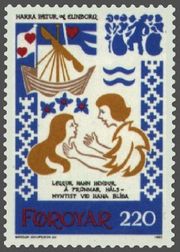
Kvæði
Encyclopedia

Ballad
A ballad is a form of verse, often a narrative set to music. Ballads were particularly characteristic of British and Irish popular poetry and song from the later medieval period until the 19th century and used extensively across Europe and later the Americas, Australia and North Africa. Many...
s of the Faroe Islands
Faroe Islands
The Faroe Islands are an island group situated between the Norwegian Sea and the North Atlantic Ocean, approximately halfway between Scotland and Iceland. The Faroe Islands are a self-governing territory within the Kingdom of Denmark, along with Denmark proper and Greenland...
, accompanied by the Faroese dance
Faroese dance
The Faroese dance is the national chain dance of the Faroe Islands, accompanied by kvæði, the Faroese ballads.The dance is a mediaeval ring dance, which only survived in the Faroe Islands, while in other European countries it was banned by the church, due to its pagan origin...
.
Kvæði can have hundreds of stanza
Stanza
In poetry, a stanza is a unit within a larger poem. In modern poetry, the term is often equivalent with strophe; in popular vocal music, a stanza is typically referred to as a "verse"...
s plus a chorus
Refrain
A refrain is the line or lines that are repeated in music or in verse; the "chorus" of a song...
sung between every verse.
It is generally thought that Faroese ballads, as elsewhere in Europe, began to be composed in the Middle Ages, but we have very little medieval Faroese writing so the ballads' medieval history is obscure. The subject matter of Faroese ballads varies widely, including heroic narratives set in the distant past, contemporary poltics, and comic tales. The most archaic-looking layer, however, is the heroic narratives. It was once thought that these derive independently from Viking-Age oral narratives, and this may be true of a few, but it has since been shown that most derive directly from written Icelandic sagas
Saga
Sagas, are stories in Old Norse about ancient Scandinavian and Germanic history, etc.Saga may also refer to:Business*Saga DAB radio, a British radio station*Saga Airlines, a Turkish airline*Saga Falabella, a department store chain in Peru...
or occasionally rímur
Rímur
In Icelandic literature, a ríma is an epic poem written in any of the so-called rímnahættir . They are rhymed, they alliterate and consist of two to four lines per stanza...
. The traceable origins of Faroese balladry, then, seem to lie between the fourteenth century (when the relevant Icelandic sagas tended to be composed) and the seventeenth (when contacts with Iceland diminished).
Faroese ballads began to be collected by Jens Christian Svabo
Jens Christian Svabo
Jens Christian Svabo was a pioneering Faroese linguist, scholar, and ethnographer. Svabo was born in Miðvágur, Vágar, the Faroe Islands to a minister and his wife. Svabo studied history, music, and theology in Miðvágur and later in Tórshavn. Between 1765 and 1800 he lived in Denmark and studied...
in 1781–1782, though Svabo's collection was not published in his lifetime; the most prominent of Svabo's successors was Venceslaus Ulricus Hammershaimb
Venceslaus Ulricus Hammershaimb
Venceslaus Ulricus Hammershaimb was a Faroese Lutheran minister who established the modern orthography of Faroese, the language of the Faroe Islands, based on the Icelandic language, which like Faroese derives from Old Norse.-Background:Hammershaimb was born in Sandavágur on the island of Vágar in...
. The Danish historians Svend Grundtvig
Svend Grundtvig
Svend Hersleb Grundtvig was a Danish literary historian and ethnographer. He was one of the first systematic collectors of Danish traditional music, and he was especially interested in Danish folk songs. He began the large project of editing Danish ballads. He also co-edited Icelandic ballads. He...
and Jørgen Bloch began the process of a complete, standard edition of the ballads, which eventually gave rise to the Føroya kvæði/Corpus carminum Færoensium, published between 1941 and 2003. Ballads took an important role in the development of Faroese national consciousness and the promotion of literacy in Faroes in the nineteenth and twentieth centuries.
Among the most famous of all kvæði is Ormurin langi
Ormurin Langi
Ormurin Langi is a ballad type song in the Faroe Islands. It was written ca. 1830 by Jens Christian Djurhuus.The song has 86 verses and is in Faeroese, and deals with the Norwegian king Olaf Tryggvason...
written by Jens Christian Djurhuus
Jens Christian Djurhuus
Jens Christian Djurhuus or Sjóvarbóndin was the first poet who wrote in Faroese. He composed several Faroese ballads in traditional style on historical themes. The best known is Ormurin langi...
and today played by the Faroese folk metal
Folk metal
Folk metal is a sub-genre of heavy metal music that developed in Europe during the 1990s. As the name suggests, the genre is a fusion of heavy metal with traditional folk music...
band Týr
Týr (band)
Týr, , is a folk metal band from the Faroe Islands. Their subject matter revolves almost entirely around old Nordic lore, mythology, and history, taking their name from a Norse god of war. They signed a worldwide deal with Austria's Napalm Records in early 2006, while signed to the Faroese record...
.
External links
- Heimskringla.no - Føroysk kvæði og vísur
- N. Kershaw, Stories and Ballads of the Far Past (Cambridge: Cambridge University Press, 1921), http://www.archive.org/details/storiesballadsof00chad, http://www.gutenberg.org/ebooks/33471.
- Finni Hansen's Faroese song page.

